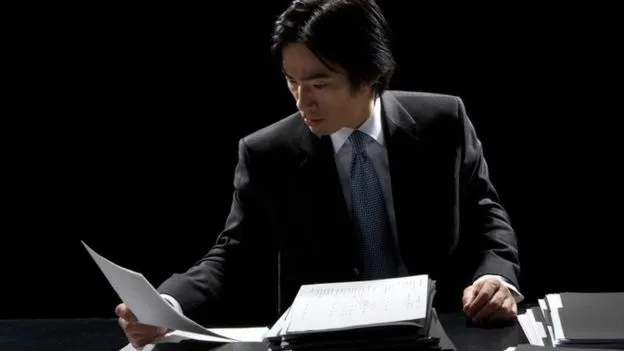
"Shut up!" Shouted the man who presided over the mesa.Todo the world stopped and looked at Keiko Sakurai, who immediately realized the mistake he had cometido.Ocurrió years ago when Sakurai worked as an assistant accountant in a large Japón.El company man (who shouted) was his client, a company executive energy services was around the cuarentena.Y, according to the traditional Japanese protocol -Respect your elders; show more deference to hierarchy-worker she knew he could justify having raised his voice.
The amazing story of how Japan accepted (finally) the existence of depression
The man had been criticizing its accounting methods while taking a few drinks after work with their colegas.Sakurai defended himself saying that their practices were adecuadas.Pero man continued to complain. So Sakurai said their methods meet the terms of the contract. "That's when I screamed," recalls Sakurai. "I broke the rules of hierarchy and contradict my superior. Even though I was right was not in a position to contradict" .

No matter that Sakurai methods were correct or approve this man most of his trabajo.Según Japanese labor hierarchy, a positive feedback is something very raramente.Los business is heard in Japan are handled according to their own standards, different from those of Western countries or even to other nations asiáticas.Y, for those working as managers for the first time in Japan, the proper way to explain to their employees their evolution in the company can be shocking.
What we can learn from inemuri, the Japanese habit of falling asleep anywhere
Reinventing the "feedback" In traditional Japanese language there was no word to describe the feedback anglicized (used in Spanish as a synonym for answer or opinion that gives us a partner on something we do) .Simply was not done, said Sharon Schweitzer, executive director of Protocol and Etiquette Worldwide and expert in the integration of managers in countries in Japan extranjeros.Si your boss does not tell you anything, it means you're doing well, "Sharon Schweitzer, an expert in protocoloAl finally had to invent a word: fīdobakku. but not yet practiced. "If your boss in Japan does not tell you anything, it means you're doing well," says Schweitzer. "And if you ask for a review of the project, then it means that you're not doing so well," she adds .The bosses in Japan do not usually ask their employees to put them up on their activities because they are expected to do all the tiempo.Es a process called hou-ren-sou and means that subordinates should send emails to their bosses all day to explain when they are going to eat, the percentage of the project that have finished or when they pause for coffee. Todo.Para foreign managers it can be tempting to respond with praise and congratulations for finishing the project, for example.

But "do not do it," says Schweitzer. "If you answer and tell them they did a good job, both you and they will be wrong. Just give thanks or no answer" .Pensar long plazoTal may think that attitude foreign manager is the best for annual reviews in the empresa.Pero personal interviews with the boss to discuss the performance not made, says Taro Fukuyama, executive director of AnyPerk, a startup that offers services to improve happiness at work. call an employee at the office for that kind of meeting will probably generate pánico.La best way to talk about their performance, says Fukuyama, is to go with them copas.Japón has a tradition called nomikai, whereby colleagues and heads go out drinking together, usually in enough quantities and even tarde.En any case, this kind of "feedback" with beer and sake tends to focus on what was done mal.La reason, says Fukuyama, it is that employees in Japan do not often changed company.

And as develop their career in the same company, the goal is the promotion; therefore, it is preferable head down and avoid mistakes. "The best way to avoid mistakes is not to take risks, so most workers do what their boss tells them," says Fukuyama.
unstarred
Foreign managers who are not justan the rules simply do not encajan.Jim Whittle realized this in the most dura.Cuando was the general manager for Japan firm McVities biscuits Digestive Biscuits, had an employee that he suggested giving away samples at metro stations to expose the product to potential clientes.La company saw its sales grow after that. So Whittle decided to congratulate his employee for the excellent idea.Y did before all the equipo.Pero was not a good idea. Although deserved recognition, make it stand made her look like a maverick whom his companions could not be trusted. "There are rules you need to learn to be effective in Japan. And if you do not learn, you will not be respected by your team," explains Whittle.

Now, Whittle works in the office of Tokyo (Japan) RSR Partners, a search firm ejecutivos.A often dealing with foreign managers and prepares them for the world of work in Japan. "Unlike other places here can not wait come and be accepted based on your past successes, "says Whittle." you have to build trust and, above all, build relationships ".
"Good enough"
Sakurai now at Aperian Global as a consultant and splits his time between San Francisco (United States) and Tokio.Ayuda executives prepare for life in Japan and also teaches japonenses leaders how to work in other task sends them países.Sakurai . must write 10 positive comments about the work of a subordinate "They tend to have difficulty with that challenge," says Sakurai.

"Sometimes only write five or six. And most are something like 'do not bad' or 'good enough'. They do not understand the idea of giving a 'feedback' positive" However, younger workers , especially in Japan, can appreciate a kind word from his boss when they do things right, Sakurai.Y added, slowly, things are changing in Japón.Algunas companies are adopting collaborative and communicative styles of management, and foreign executives who work in them can experience the positive fīdobakku "But if you go around telling employees' excellent work 'you may wonder what is wrong will think:..?' what's great about my work is what I'm supposed to do, ' "says Sakurai." instead, what you need to do is understand the nonverbal cues of employees to see if your comments are well received "and so, as in any else in the world, saying "good job" may be simply the motivation that employees need.